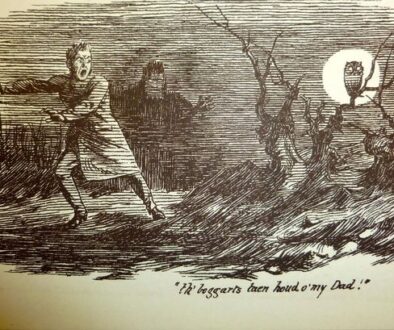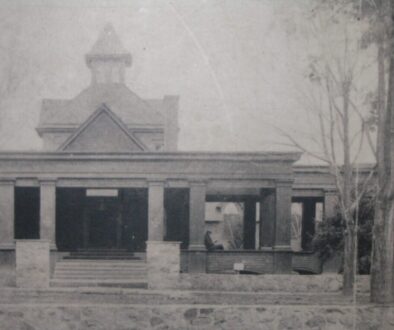The January Curse
[The idea that any person or family could be cursed by a single month is one thing. The chance that there could be any validity to it is another. From the Southern side of my family comes this apparent phenomenon they always called, “the January Curse.”]
Astronomical portents and synchronistic curses are such legendary subjects that they’ve become plot devices in the arts.
“Beware the ides of March” (Shakespeare’s Julius Caesar) is one of the most famous lines of the stage.
The Aztec king most often called Montezuma was said to have been deviled by signs in the sky on the day the Conquistador Cortez landed.
And all you need to do is take a look at the string of correspondences between the assassinations of Lincoln and Kennedy to get wondering. Some of them are numerological and some situational. (Lincoln’s assassin pulled the trigger in a theater and was cornered in a warehouse. Kennedy’s killer took aim from a warehouse and ran into a theater.)
In my mother’s side of the family the first month of the year was considered “such a good time to die” as the Seneca say (if you have pushed things that far) that New Year’s Eve was the signal for a four-week timeout from any faintly risky behavior. If they knew what was good for them, anyone whose last name was Ward stayed home and in bed as much as possible till February broke. Nobody got on a boat or plane. Doctor visits were common, and travel was short and scarce.
My mother’s Ward and Childers ancestors circled wagons in the Carolinas, particularly in the Piedmont of South Carolina, the “moon-and-palmetto state.” They’ve been there a long time. I wish I knew more about them so I had more clues by which to trace them. I also wish I was better at internet genealogy.
The story may start with my Southern grandfather, William Gray Ward, who always inclined his two daughters to believe that the family odds of checking out in January were considerably better than one in twelve. From that we gather that the tradition was already established by his lifetime, so it has to go back at least a generation further.
Only the most remarkable factoids about Will Ward have made their way to me. His nickname was “Cap,” which seems unusual, since my dad’s father’s nickname was “Cappie.” Seems like a lot of Caps for one family.
Sometime during his youth it was discovered that Will Ward could do complex calculations accurately and instantaneously in his head. He was a mathematical savant. He was not quite up there with the legendary and world-famous ones you can read about, but he was still impressive, and with a far solider foothold in reality. He could whip any of the adding machines of the day and thus could serve as a wonderful ad lib negotiator at high-level sales meetings for Arkwright Mills in Spartanburg, SC.
Will Ward was a long way from the “Rain Man,” the classic “idiot savant.” (Surely we could come up with a more PC term.) An idiot savant is someone with a low IQ but an incredible ability in some challenging field like music or math. Such people may not ever learn to read or write, and they usually can’t care for themselves in society, but some part of their brains just zaps in on a special pursuit. You really do start to consider paranormal – ESP – theories for this indisputably real phenomenon.
I suggest that my grandfather might have been an “eccentric savant,” or even just a shy one. He had a foot far enough into the practical world to be managing a plant for Arkwright Mills. I conclude that he wasn’t as far to the spacey side as his only grandson (whom I would nominate to run nothing more detail-oriented than a popsicle stand).
I’ve seen a few pictures of the white-haired, slender gent. I have no images of him outside those summer suits: khakis, seersuckers, and even that white “Mark Twain Tonight” getup that the author called his “don’tcareadamn” outfit. An honored graduate of Wofford College (Spartanburg, SC), Will Ward filled his house with books. Many of them were still around when I visited as a boy. I remember coming across a volume of Celtic sagas there. I remember its navy, gold-trimmed cover. It had few illustrations and was fairly dense, but because I sensed that it was heroic and mythological I gave it a better-than-your-average shot before running out to the park across the street. Its contents I would someday value a lot more.
Will Ward always claimed to be descended from the family of British poet Thomas Gray (1716-1771). Gray’s famous “Elegy Written in a Country Churchyard” was his lifelong favorite poem, and he was far from the only one. It’s hard to overstate the extent to which Gray and his “Elegy” were revered in his day. (An elegy is a somber, formal poem, usually about the subject of a death or a loss.) For most of the 19th century all you needed to say was, “the Elegy” for any educated English speaker to know what you meant.
William Gray Ward wouldn’t be the first person to claim an ancestry not his own, and even when it’s my own family I keep an eye out. The connection, though, to Thomas Gray is reasonable. The poet had no children that we know of, but to have descended from the Gray family is no impossibility. There is that middle name, too, so whoever christened my august grandfather must have thought the same thing. The connection probably comes through the family of the Hamptons of Virginia and South Carolina, to which we know my grandfather was related. [That line in the Elegy, “some village Hampden” eluded critics for quite some time, but it probably referred to John Hampden (1596-1643), an obscure figure otherwise who boldly stood up to Charles I. Scholars speculate that Gray picked this local hero to mention in his poem because the fellow was someone in his own ancestry. The fact that the English Hampdens came out eventual losers in the cycle of the British Civil War/Restoration would account for their early skedaddle to the Americas, as well as the simpler spelling of the name.]
Will Ward may or may not have been a long-range nephew of the author of the Elegy, but a sympathetic connection could be shown by a strain of nervous wackiness that runs through a string of English poets. My Southern grandfather was known to sleep at night with a loaded pistol under the pillow. Not only was this much to the discomfort of my grandmother, it was hardly necessary on Glendalyn Place in Spartanburg, as discreet a neighborhood then as it is now. It must have been his dreams that scared him.
The gesture was, however, quite in keeping with at least two prominent British Romantics, Byron and Shelley, known for indirectly founding the Gothic strain of British literature. (It was Percy Shelley’s wife Mary who wrote Frankenstein based on an 1819 conversation with these two in an Alpine castle. And the same night their guest Dr. John Polidori wrote almost the full text of “The Vampyre,” a short story credited for inspiring Bram Stoker’s novel and hence launching today’s vampire craze.) Lord Byron slept with drawn sabers and loaded pistols almost wherever he went. And Shelley, though a confirmed pacifist, was so terrified by his too-real dreams that he, too, packed heat before sawing logs. It was as if the creations of their own imaginations might, like Frankenstein’s monster, have gotten too much for them once the sublime unconscious was loosed in sleep.
Back to the January curse, my grandfather, and his damn pistol. One night in the 1940s somebody twitched the wrong way. The fool gun went off and pumped a round into the floor of the bedroom. On its way to oblivion in the red soil of the Piedmont, it passed through the kitchen and into a small extra bathroom in the garage where it may have shattered a sink. I know my grandmother got in a word or two about the matter. Still, the conviction in the old gent that he had to be ready for anything was so strong that he couldn’t be talked out of the practice all the way. Maybe he agreed to keep the safety on or at least leave the thing holstered on a night-stand. Whether it was the Curse or something else that might be coming for him in the darkness, if he was going down, Will Ward was going to do so shooting. The old lad passed into spirit on January 29, 1959.
I barely knew my grandmother Mary Childers Ward, though I have some memories of her as a very old person. I do remember that she looked remarkably like my mother in her old age, with pale, delicate skin, high cheekbones, and the same sharp nose with a bit of a bridge in it. (“Roman” or “aquiline” they might have called it.) Mary Childers Ward was gracious and delicate, but a shy bird. She was really batty in her last few years.
My dad told me a few things about her when I came of age. Her main dread, the poor thing, after she was widowed was running out of fuel oil and freezing in her house. In South Carolina… When my parents emptied her house they found up to a hundred little notes all over it bearing, in her handwriting, “Willard Oil (Company)…” and the phone number. If she slipped and broke her hip as the lights went out and the heat shut off – during a shocking cold spell, doubtless in January – she would have been able to reach one of these from wherever she would have fallen. She passed into peace on January 25, 1972.
My mother’s only sister Ruth Ward Wells had the reputation of “a character,” as they say in the mid-20th century South. In Northernese this means something like, “knows her mind,” or even, “can be a handful.” Uppity might be a good word for it today. It would be nothing out of personality on either side of my family. To me she was no less than the ideal aunt. She was a knockout blonde who had a long marriage with Robert Wells, as much an uncle to me as anyone of my blood could have been. (Uncle Bob was Joe College, a powerfully built Chapel Hill ex-athlete, and a Tarheel to his last day.) I loved them both – hard.
Aunt Ruth passed in her 90th year. Her official date of death is December 31, 2004, but I think this is because that midnight was when she was last observed alive. She took her last breath in her sleep in the early hours of New Year’s Eve 2005. Another January cross-over.
As those of you who have followed my website will remember, my mother Frances Ward Winfield passed into Spirit on the afternoon of January 15, 2003. I cradled her body as she took her last breath.
I’ve written a lot about the passing of both parents, and much of what I have learned and tried to share with others about human life and its spirituality has this cycle as a backdrop. By now my reactions to that most natural of scenarios – loss – has become a theme for measuring my own self-understanding.
As a male, a Yankee, and one-fourth each a Childers and a Ward, I say, as Hamlet said, to this January Curse: Not a whit, we defy augury. I do not dread it or the month. I actually like this time of year. It’s a break after the holiday season and a welcome time-out from the work crunches I encounter at other seasons. The skiing is often the best of the year, and the fallow month is a great time to go inward, to read, write, and grow. Still, I find it something curious – four people in a small family dying in the same month of the year.
Unless they’re driving buzzed in the same speeding car, the odds of half a nuclear family of four checking out in the same month of the year are high. Twelve times twelve. One in 144. Imagine it for the whole brood. According to my calculator, that’s one in 20,736. Pretty high odds, wouldn’t you say? And there has to be more to it. The January Curse, if you will, was so proverbial in my mother’s family that she was told of it as a girl. Maybe some genealogy expert out there will look up some dates and see if it’s a Ward thing or a Childers one, too. Maybe that would tell us how far back the custom could really go.
Till then my Southern cousin Dr. Anna Wells Bloomer and I will just have to watch our steps till Imbolc, the Celtic festival marking the first of February. Then we can give each other a congratulatory phone call, raise a toast, think ourselves good, and play with house money till another New Year’s.




